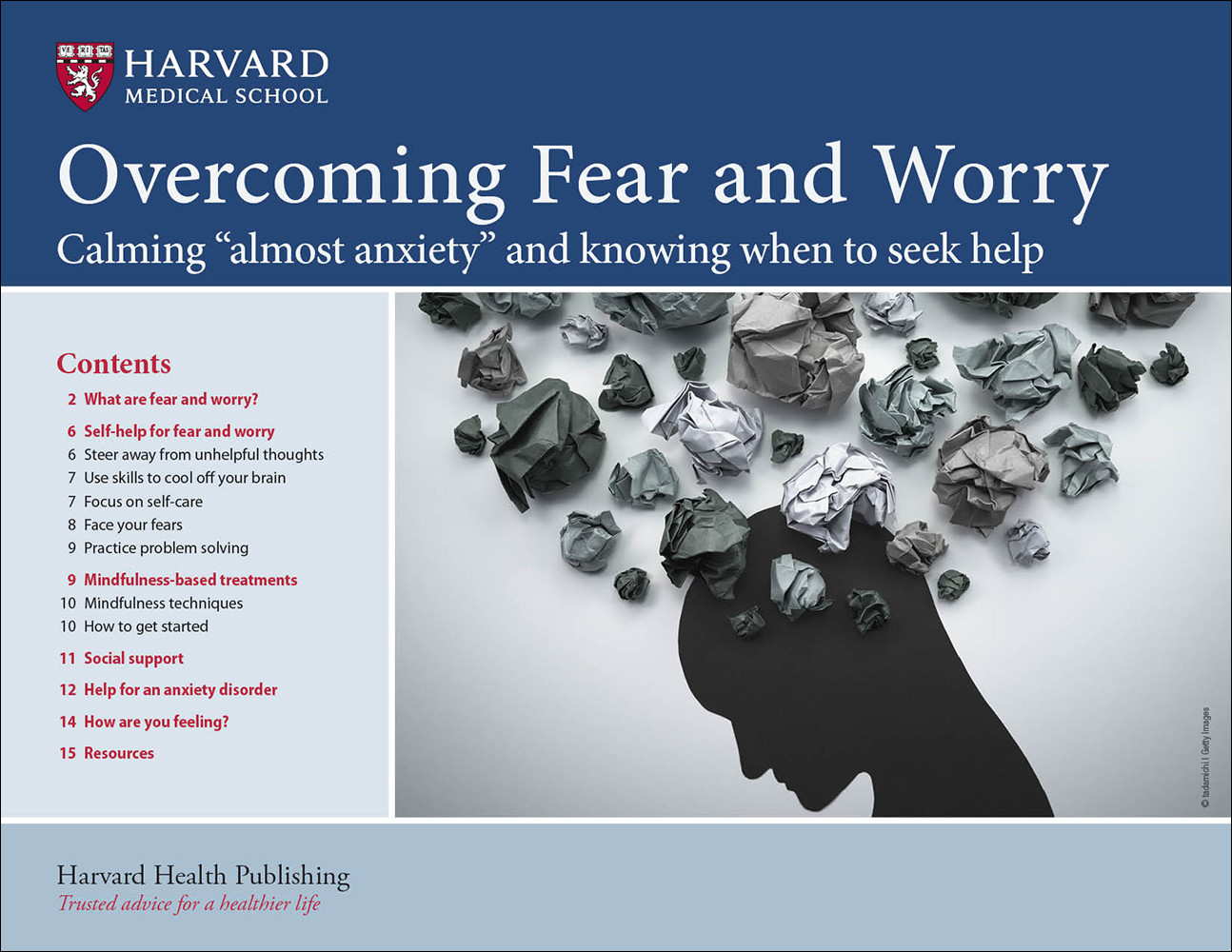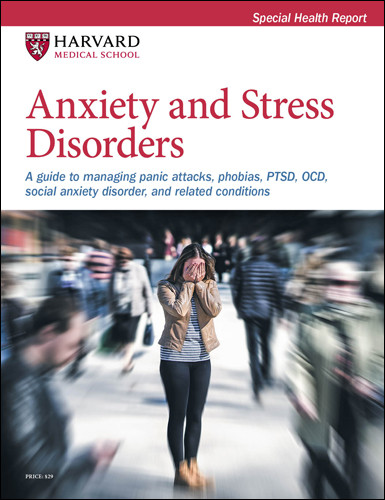
5 timeless habits for better health

What are the symptoms of prostate cancer?

Is your breakfast cereal healthy?

When pain signals an emergency: Symptoms you should never ignore

Does exercise give you energy?

Acupuncture for pain relief: How it works and what to expect

How to avoid jet lag: Tips for staying alert when you travel

Biofeedback therapy: How it works and how it can help relieve pain

Best vitamins and minerals for energy

Should you take probiotics with antibiotics?


Overcoming Fear and Worry
Feelings of fear and worry are perfectly natural. However, worrying constantly or excessively about what ‘may’ happen can get you stuck in a cycle of harmful thoughts and behaviors. Now in a Special Health Report from Harvard Medical School, our experts bring you practical ideas based on the latest research to help you overcome feelings of fear and worry. By understanding the real reason why you worry, you can take effective action towards feeling at ease and at peace.
Other Product Information
Read Overcoming Fear and Worry and discover:
- The “How anxious are you?” quiz. Take this quiz to rate your anxiety level and find out if you are truly anxious or experiencing “almost” anxiety.
- When anxiety is good. You might be surprised to learn that research shows that a certain level of anxiety can work to your advantage and help you achieve optimal performance. Find out how much stress is too much stress.
- Mindful-based treatments to prevent you from falling down the rabbit hole of worry.
- How to find social support networks that can ease the anxiety you feel.
- The signs of a true anxiety disorder and the 4 types of disorders people suffer from. Discover what to do if you suffer from any of these anxiety disorders.
- And so much more!
Prepared by the editors of Harvard Health Publishing in consultation with Luana Marques, PhD, Director, Community Psychiatry Program for Research in Implementation and Dissemination of Evidence-Based Treatments, Massachusetts General Hospital and Associate Professor of Psychology, Department of Psychiatry, Harvard Medical School. (2022)
About Harvard Medical School Guides
Harvard Medical School Guides delivers compact, practical information on important health concerns. These publications are smaller in scope than our Special Health Reports, but they are written in the same clear, easy-to-understand language, and they provide the authoritative health advice you expect from Harvard Health Publishing.
Avoiding avoidance
When faced with something we fear, we have the choice to fight or flee. There is also a third option: to avoid. Avoidance is a way to escape an uncomfortable situation. It can take many forms: playing a video game instead of studying for a difficult test, taking the ski lift back down instead of skiing down the mountain, and dragging a friend to every party with you are a few examples of avoidance. Going to a party, but standing at the bar instead of mingling with strangers, is a more subtle form of avoidance.Avoidance might reduce your anxiety level in the moment, but it’s not a long- term strategy. You’ll never learn what could happen if you engage in the situation, and so avoidance will only prolong your anxiety. In the long term, it can lead to isolation, increased anxiety, additional family and work conflicts, and even drug or alcohol use as a coping mechanism.
If, instead of avoiding, you face your fear and mingle at that party or study for that test, you’ll probably discover that your worst-case scenario never did transpire. Ultimately, facing your fear will make you feel more comfortable—and better equipped—to handle the situation when it arises again in the future.
- What are fear and worry?
- Self-help for fear and worry
- Steer away from unhelpful thoughts
- Use skills to cool off your brain
- Focus on self-care
- Face your fears
- Practice problem solving
- Mindfulness-based treatments
- Mindfulness techniques
- How to get started
- Socialsupport
- Help for an anxiety disorder
- How are you feeling?
- Resources
You might also be interested in…

Anxiety and Stress Disorders: A guide to managing panic attacks, phobias, PTSD, OCD, social anxiety disorder, and related conditions
Everyone worries or gets scared sometimes. But if you feel extremely worried or afraid much of the time, or if you repeatedly feel panicky, you may have an anxiety disorder. Anxiety disorders are among the most common mental illnesses, affecting roughly 40 million American adults each year. This Special Health Report, Anxiety and Stress Disorders, discusses the latest and most effective treatment approaches, including cognitive behavioral therapies, psychotherapy, and medications. A special section delves into alternative treatments for anxiety such as relaxation techniques, mindfulness meditation, and biofeedback.

5 timeless habits for better health

What are the symptoms of prostate cancer?

Is your breakfast cereal healthy?

When pain signals an emergency: Symptoms you should never ignore

Does exercise give you energy?

Acupuncture for pain relief: How it works and what to expect

How to avoid jet lag: Tips for staying alert when you travel

Biofeedback therapy: How it works and how it can help relieve pain

Best vitamins and minerals for energy

Should you take probiotics with antibiotics?
Free Healthbeat Signup
Get the latest in health news delivered to your inbox!
Sign Up